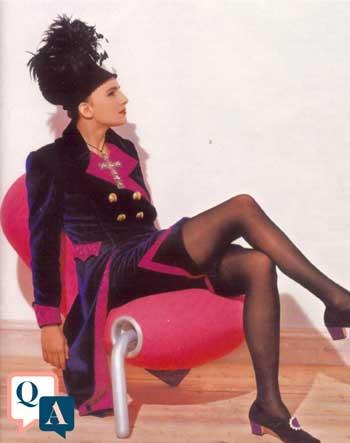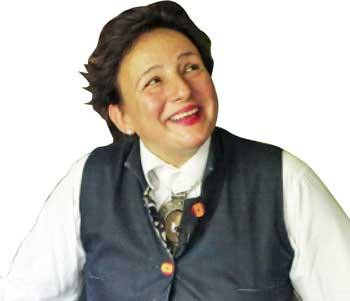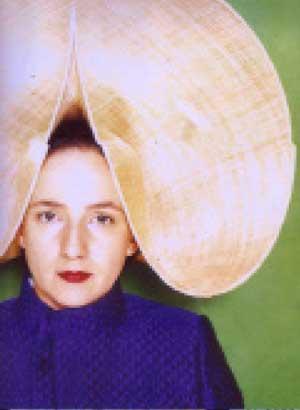 Based in the UK, Brit Sri Lankan fashion designer Selina Blow is one who is immensely proud of her Sri Lankan heritage. The daughter of flamboyant Helga De Silva Blow Perera, the chatelaine of Helga’s Folly in Kandy and the late writer and historian Jonathan Blow, creativity courses through Selina’s veins. Selina’s family is peppered with members who have contributed greatly to arts, architecture and politics. Her paternal grandfather Detmar Jellings Blow was an Architect primarily in art and design and had his collections exhibited at the V&A and the Metropolitan Museum in New York. Selina’s mother Helga is a great artist having transformed Helga’s Folly into a living museum of art. On her maternal side Selina counts as her great aunt the famous female architect Minette De Silva, while her uncle was the much respected lawyer Desmond De Silva QC who strode the world’s legal stage with great panache and expertise. Her maternal Grandfather Edmond Frederick De Silva was a politician, ambassador and writer.
Based in the UK, Brit Sri Lankan fashion designer Selina Blow is one who is immensely proud of her Sri Lankan heritage. The daughter of flamboyant Helga De Silva Blow Perera, the chatelaine of Helga’s Folly in Kandy and the late writer and historian Jonathan Blow, creativity courses through Selina’s veins. Selina’s family is peppered with members who have contributed greatly to arts, architecture and politics. Her paternal grandfather Detmar Jellings Blow was an Architect primarily in art and design and had his collections exhibited at the V&A and the Metropolitan Museum in New York. Selina’s mother Helga is a great artist having transformed Helga’s Folly into a living museum of art. On her maternal side Selina counts as her great aunt the famous female architect Minette De Silva, while her uncle was the much respected lawyer Desmond De Silva QC who strode the world’s legal stage with great panache and expertise. Her maternal Grandfather Edmond Frederick De Silva was a politician, ambassador and writer.
 This eclectic trove of family members created a rich tapestry which inspired Selina in her own creative pursuits as a respected fashion designer in the UK. In the 90s Selina was part of London’s IT crowd. A regular in society magazines and broadsheets, Selina and her family including her late sister-in-law Isabella Blow were featured for their flamboyant lifestyle and contribution to fashion.
This eclectic trove of family members created a rich tapestry which inspired Selina in her own creative pursuits as a respected fashion designer in the UK. In the 90s Selina was part of London’s IT crowd. A regular in society magazines and broadsheets, Selina and her family including her late sister-in-law Isabella Blow were featured for their flamboyant lifestyle and contribution to fashion.
While in Sri Lanka recently to visit her mother and genial stepfather Desmond Perera, amidst the chattering of monkeys and the partaking of a sumptuous meal at Helga’s Folly, Selina spoke openly about what draws her to Sri Lanka and her life in London as a fashion designer.
Q What is your earliest memory of Sri Lanka?
It was February 1978, we had just arrived on an Air Ceylon flight and I remember the blast of intense heat when the doors . Those days everyone went to rest houses and I remember stopping at the Negombo resthouse which was totally deserted. There was a fishing boat and we had tea and sandwiches.
Q How did you get into a career in fashion?
I was never actually interested in fashion. I never liked being called a designer, I thought it sounded too fanciful and too important. I didn’t go to college. I was successfully bad in most things I did in education. My main interest was textiles and tailoring and it’s something I fell into as that was where my interest lay.
 Q You haven’t had any formal training as a designer as such?
Q You haven’t had any formal training as a designer as such?
No! I would’ve been very quickly shown the exit point. I can’t even thread a needle but my forte is, textiles fabric, tailoring, flamboyance and simplicity. Fashion designer was something I was planning on doing for a modest amount of time but it has continued for many long years, probably about 25 years.
Q Your mother Helga is great fashion icon. How has she influenced you in fashion?
My mother is always very stylish in a very elegant and understated way. My maternal grandmother was very elegant and as a child I remember the drapes and the folds of the Benares sarees she wore with such style and elegance. When my mother lived in a very rural part of England where most people would walk in fishermen coats and rubber boots, my mother would appear like a breath of fresh air in her chic attire.
Q Your mother has a great collection of hats. Are you partial to hats too?
I like the hats because they come from a close friend of ours, Philip Treacy who we all shared a studio with. He is a family friend and he makes extraordinary beautiful hats. I think dealing with space is incredibly impressive and the shape and the beauty. Both my mother and I have our own collection of hats and they becomes your friend, your armour.
Q What have been your most memorable moments in fashion?
I would like to think of them as inspirational moment. My late sister- in- law, Isabella Blow was very involved in design and supporting protégés of unusualness. I was quite influenced by her but I think every story is of interest, whether it’s finding a beautiful button, seeing a fabric, meeting a curious person, there is no defining moment.
Q How has the pandemic affected your business?
It has been a real shocker, for small independent bespoke businesses that can’t naturally translate to wholesale. All our collections are ready to wear but with a lot of it is tailoring and fit. I would say it was very challenging and very difficult to do. We had to streamline like a lot of people did. It is not just my business, all the people involved, from the tailors, the craftsmen, the buttonholers and the fabric merchants, this whole community of craftsmen were badly hit. This made many people including me go back to the drawing board. I focused more on my next collection. I think the silence of the shutdown in a way made me stop the clock and enjoy my work.
Q There is a lot of fast fashion happening in the West, how would you position yourself?
I am an advocate of pure timelessness of beautiful tailoring, which takes you through your life as a good friend. I don’t like fast fashion because fashion. It doesn’t matter even if it’s from a vintage shop or something expensive, your purchase will become your friend. Sadly we seem to be overtaken with fast fashion.
Q How are you embracing social media to promote your brand?
To be honest, I don’t use social media hugely. I think there is too much of it. It gets repetitive, and it loses its uniqueness. However, I do use Instagram. I keep images very filtered than clear and sharp and curious.
Q You used to retail in the big stores in the USA, how is that going?
Obviously, the big department stores are having a very difficult time like the rest of the world. However, I do a lot of private work in the USA, particularly in New York. I work for a TV series there and I also work for the MET in New York
 Q You have many celebrity friends, who are your celebrity customers?
Q You have many celebrity friends, who are your celebrity customers?
The nice thing about my work is that it is timeless, it can go from someone who is 25 to 105, therefore, you’re never going to hit a certain a set. So you can get people from Angelica Houston, Debbie Harry and Joan Collins as my customers, but I don’t really see them in their light.
Q How important is it for you to maintain links with your family in Sri Lanka?
I think it is of great relevance. I’ve always been very proud of my Sri Lankan mother and familyI remember my maternal grandparents coming over to England and playing cricket with us. The chicken curries, the pots, the love cake the hoppers we had in England are still etched in my mind. My family in Sri Lanka have a long association with politics, law and humanitarianism. We have feisty women such as my great aunt Minette, the first Asian architect of RIBA. She succeed in a time where being an Asian woman in the West was not an easy thing. I really admire their courage and their strength and how it fought through much adversity.
Q So how does it feel like to be back in your second home in the Folly in Kandy?
I love to be in Kandy, with my mother and my family and everyone here. I don’t really see it as a first or second home, it’s my home, the only problem is geographically they are quite far apart so airplanes are required.
Q Where do you Selina Blow in 5 years’ time?
I still hope it’s on peoples’ backs and not in wardrobes. I would like to see my clothes being enjoyed and passed down generations like heirlooms.
 Based in the UK, Brit Sri Lankan fashion designer Selina Blow is one who is immensely proud of her Sri Lankan heritage. The daughter of flamboyant Helga De Silva Blow Perera, the chatelaine of Helga’s Folly in Kandy and the late writer and historian Jonathan Blow, creativity courses through Selina’s veins. Selina’s family is peppered with members who have contributed greatly to arts, architecture and politics. Her paternal grandfather Detmar Jellings Blow was an Architect primarily in art and design and had his collections exhibited at the V&A and the Metropolitan Museum in New York. Selina’s mother Helga is a great artist having transformed Helga’s Folly into a living museum of art. On her maternal side Selina counts as her great aunt the famous female architect Minette De Silva, while her uncle was the much respected lawyer Desmond De Silva QC who strode the world’s legal stage with great panache and expertise. Her maternal Grandfather Edmond Frederick De Silva was a politician, ambassador and writer.
Based in the UK, Brit Sri Lankan fashion designer Selina Blow is one who is immensely proud of her Sri Lankan heritage. The daughter of flamboyant Helga De Silva Blow Perera, the chatelaine of Helga’s Folly in Kandy and the late writer and historian Jonathan Blow, creativity courses through Selina’s veins. Selina’s family is peppered with members who have contributed greatly to arts, architecture and politics. Her paternal grandfather Detmar Jellings Blow was an Architect primarily in art and design and had his collections exhibited at the V&A and the Metropolitan Museum in New York. Selina’s mother Helga is a great artist having transformed Helga’s Folly into a living museum of art. On her maternal side Selina counts as her great aunt the famous female architect Minette De Silva, while her uncle was the much respected lawyer Desmond De Silva QC who strode the world’s legal stage with great panache and expertise. Her maternal Grandfather Edmond Frederick De Silva was a politician, ambassador and writer. This eclectic trove of family members created a rich tapestry which inspired Selina in her own creative pursuits as a respected fashion designer in the UK. In the 90s Selina was part of London’s IT crowd. A regular in society magazines and broadsheets, Selina and her family including her late sister-in-law Isabella Blow were featured for their flamboyant lifestyle and contribution to fashion.
This eclectic trove of family members created a rich tapestry which inspired Selina in her own creative pursuits as a respected fashion designer in the UK. In the 90s Selina was part of London’s IT crowd. A regular in society magazines and broadsheets, Selina and her family including her late sister-in-law Isabella Blow were featured for their flamboyant lifestyle and contribution to fashion.  Q You haven’t had any formal training as a designer as such?
Q You haven’t had any formal training as a designer as such? Q You have many celebrity friends, who are your celebrity customers?
Q You have many celebrity friends, who are your celebrity customers?